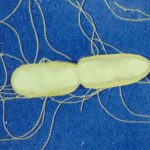Lien vers Pubmed [PMID] – 24478769
Front Microbiol 2014;5:12
Salmonella enterica serovars Typhi and Paratyphi A isolates from human patients in France displaying different levels of resistance to quinolones or fluoroquinolones were studied for resistance mechanisms to these antimicrobial agents. All resistant isolates carried either single or multiple target gene mutations (i.e., in gyrA, gyrB, or parC) correlating with the resistance levels observed. Active efflux, through upregulation of multipartite efflux systems, has also been previously reported as contributing mechanism for other serovars. Therefore, we investigated also the occurrence of non-target gene mutations in regulatory regions affecting efflux pump expression. However, no mutation was detected in these regions in both Typhi and Paratyphi isolates of this study. Besides, no overexpression of the major efflux systems was observed for these isolates. Nevertheless, a large deletion of 2334 bp was identified in the acrS-acrE region of all S. Typhi strains but which did not affect the resistance phenotype. As being specific to S. Typhi, this deletion could be used for specific molecular detection purposes. In conclusion, the different levels of quinolone or FQ resistance in both S. Typhi and S. Paratyphi A seem to rely only on target modifications.


